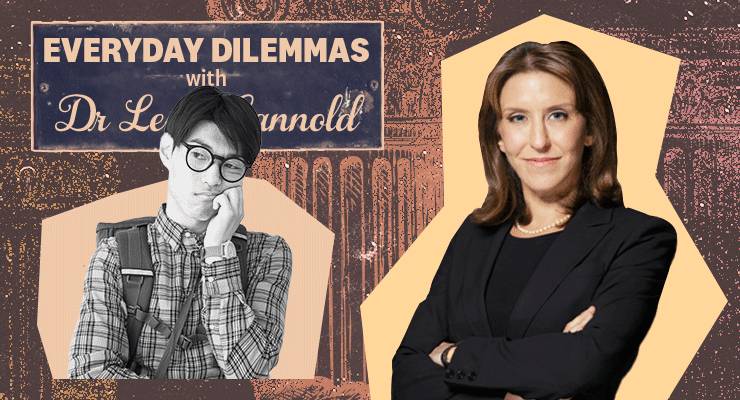
Dr Leslie Cannold used to present Both Sides Now, but now she’s cutting to the chase: what’s the right way to go? In Everyday Dilemmas, Cannold brings her ethical training to your problems. Send your questions to letters@crikey.com.au with “Dear Leslie” in the subject line. She might even reply…
Dear Leslie,
My mum told me this story when I was young. Her brother was a sailor. At port, a cousin and her new husband and baby came to see him. He — my uncle — threw the baby in the air but she hit the low ceiling and died instantly. He has been outcast from the family since; no one even knows if he’s alive. My question is: was that the right way to respond?
Wrecked in Whittlesea
Dear Wrecked,
That is a vivid and sad tale that I can well imagine became lodged in your mind as a child. Tragic and horrible are the words that come to mind, along with a deep sorrow for everyone involved. Not because any of them deserve judgment but because no one does. It was a tragic accident.
Despite this, the human need to assign blame for bad things that happen is so ingrained that even when no one is morally responsible for a bad outcome, we try to assign blame anyway. It sounds like this is what the cousin did. At a time of such intense shock and grief, she wanted the person who was causally responsible for her baby’s death to pay — whether he was morally culpable or not.
Understandable? Yes. Morally defensible? Not really. As the Stanford Encyclopedia of Philosophy reminds us: “Moral responsibility should … be distinguished from causal responsibility. The powers and capacities that are required for moral responsibility are not identical with an agent’s causal powers, so we cannot infer moral responsibility from an assignment of causal responsibility.”
Sometimes, time tempers the intensity of such emotions and forgiveness and reconciliation follow. This would be the ideal, not just for your uncle and the cause of family unity but because holding on to such strong unresolved emotions is not good for anyone’s mental health.
I hope your family finds a path for reconciliation and inner peace.
Leslie
Dear Leslie,
I have just finished my final high-school exams and am dog-tired. I have no idea what to do next year. Everything seems to suck — uni, work, travel. How do I frame up the next year or so of my life in such a black mood? Do you have any tips or help for a bright kid stuck in a cave? Did you feel the same when you were my age?
Confused of Werribee
Dear Confused,
Yes, I did feel the same way even though I’d been through nothing like what your class and that of 2020 has endured. The past few years have been tough for everyone, but young people who had their learning and social environments turned upside down can be forgiven for feeling a bit wasted at the end of two years of all work and very little play. In fact, you deserve a pat on the back for persevering and getting through it. Not everyone could or did.
My existential angst began in high school and didn’t resolve until midway through university. In fact I became clinically depressed, though for full disclosure I had some family dramas going down that didn’t help. Eventually — although I resisted it until I started crying from a stubbed toe and then just couldn’t stop — I got some psychological counselling that helped a lot.
I also found comfort in existential philosophy. It validated my conclusion that life had no inherent meaning and was absurd (which made me feel less alone) and proposed a solution that makes sense to me to this day. (You must make that meaning yourself.)
Finally, I took comfort from walking in graveyards during those years. Particularly the ones with ancient headstones. Somehow it put my worries into perspective. It also reminded me that while I had an eternity to spend underground, I had just a few years to live, and so should make the best of the time I had now.
I really hope that helps.
Leslie
Send your dilemmas to letters@crikey.com.au with “Dear Leslie” in the subject line and you could get a reply from Dr Cannold in this column. We reserve the right to edit letters for length and clarity.








“Finally, I took comfort from walking in graveyards during those years. Particularly the ones with ancient headstones. Somehow it put my worries into perspective. It also reminded me that while I had an eternity to spend underground, I had just a few years to live, and so should make the best of the time I had now.”
That’s a really excellent observation Leslie, I shall remember that one, thanks 🙂
I’m glad it helped Glenn. Thanks for reading and taking the time to comment.
I like your advice about walking in graveyards, I do the same thing for much the same reason. We really undervalue the value of cemeteries, especially old somewhat neglected ones. Deterring municipal tidier-uppers is always a problem.
the Goths have much to teach us